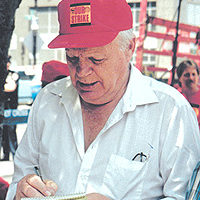NEW HAVEN, Conn. – Eight hundred people filed out of the Center Church here, and lined up on College Street at 5:30 p.m. on Sept. 26. Facing them on the sidewalk were 2,000 supporters. Downtown traffic came to a halt.
The occasion was the ongoing struggle between Yale University, which dominates the city, and New Haven’s communities and workers.
Over 4,000 members of Locals 34 and 35 at Yale University have been without a contract since January. At Yale New Haven Hospital, 150 food service workers in District 1199 have been working without a contract for two years. Close to 2,000 more hospital workers are trying to win union recognition, while graduate teachers at Yale are fighting for bargaining rights for their union.
In New Haven, among the poorest cities in the nation, community leaders are looking for more of Yale’s jobs to go for city residents, and greater contributions from the university to reduce class size in public schools.
These currents were all represented in the ranks of those arrested and their supporters. Blue- and white-collar union workers, graduate teachers, Yale faculty and undergraduate student supporters, and even management workers, were all there. Yale retirees were there, along with union leaders from across Connecticut.
Rev. Edwin Edmonds, dean of the African-American clergy in New Haven, led the procession. He was pushed in his wheelchair by Rev. Scott Marks, director of the Connecticut Center for a New Economy (CCNE) in New Haven. They were joined by clergy from many African American, Latino and white congregations, as well as many of their parishioners.
Perhaps the most courageous participants were the hospital workers who joined in the civil disobedience in an effort to win union recognition. The next day, the union put up posters in the hospital, showing pictures of the rank-and-file leaders who “stood up for change,” calling on other workers to join.
The demonstration was solemn, peaceful, almost ceremonial. The two long lines of participants stood in silence, holding hands. After three formal warnings, the police arrested them in groups, bringing them to tables set on the New Haven Green. The protestors were issued summonses, which carry an $88 fine.
The event seemed woven from threads of the 1960s Civil Rights movement, the 1980s anti-apartheid movement and a long tradition of labor struggle. Before the demonstration, New Haven Federation of Teachers retiree Lula White addressed the crowd in the Center Church. She related her experience sitting in for freedom in the South in the 1960s, and being arrested in the 1970s with hundreds of other teachers for violating a no-strike law. She received a standing ovation when she related those events with Yale workers today.
All of the unions are part of the Federation of Hospital and University Employees (FHUE), a close-knit coalition that includes members of two international unions.
Following the protest, Locals 34 and 35 presented new contract proposals to the university, which were turned down. An overwhelming strike vote was taken prior to the protest. Workers are gearing up for their next action in early November.
The author can be reached at arthur.perlo@pobox.com







